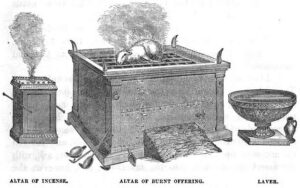“Then another angel, having a golden censer, came and stood at the altar. He was given much incense, that he should offer it with the prayers of all the saints upon the golden altar which was before the throne. And the smoke of the incense, with the prayers of the saints, ascended before God from the angel’s hand” (Revelation 8:3-4).
 Revelation 8:3 draws upon the imagery of an Old Testament-era priest and the sacrificial offerings of that period. For instance, the Biblical book of Leviticus tells us that some of the glowing embers from the altar were carefully transferred to a censer on the Day Of Atonement and combined with fragrant incense for presentation before the Lord (see Leviticus chapter sixteen).
Revelation 8:3 draws upon the imagery of an Old Testament-era priest and the sacrificial offerings of that period. For instance, the Biblical book of Leviticus tells us that some of the glowing embers from the altar were carefully transferred to a censer on the Day Of Atonement and combined with fragrant incense for presentation before the Lord (see Leviticus chapter sixteen).
While the Biblical Scriptures do not provide us with an exact description of a censer, it may have resembled a shovel-like object, a ladle, or a bowl-shaped device with an elongated handle. Since Revelation 5:8 earlier referenced “bowls” of incense, some form of that shape seems most likely. But more significant is the fact that this incense was offered “…with the prayers of all the saints.” Once again, this divine association of human prayer with the pleasing aroma of fragrant incense should encourage us to commune with God in prayer.
However, this reverent scene was about to change dramatically…
“Then the angel took the censer, filled it with fire from the altar, and threw it to the earth. And there were noises, thunderings, lightnings, and an earthquake. So the seven angels who had the seven trumpets prepared themselves to sound. The first angel sounded: And hail and fire followed, mingled with blood, and they were thrown to the earth. And a third of the trees were burned up, and all green grass was burned up” (Revelation 8:5-7).
In the original language of this passage, the phrase “burned up” conveys the image of something that has been burned to the ground or wholly consumed. (1) The prospect of one-third of our planet’s surface being destroyed in such a manner is difficult to fully grasp. For instance, consider the devastation that would be wrought by the incineration of the world’s pasture lands and one third of all trees. That figure might also encompass one third of the rice, wheat, and other grains that feed much of the world’s population.
The scope of such destruction is almost too terrible to contemplate. Finally, there is a reference to hail and fire mixed with blood. Whatever the precise meaning of that phrase, it is certain to be highly destructive as well.
Image Attribution : illustrators of the 1890 Holman Bible, Public domain, via Wikimedia Commons
(1) G2618 – katakaio – Strong’s Greek Lexicon (kjv). (n.d.). Blue Letter Bible. https://www.blueletterbible.org/lexicon/g2618/kjv/tr/0-1/

